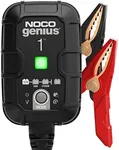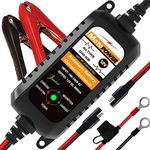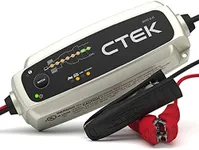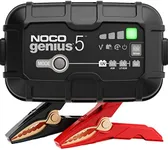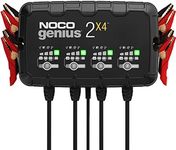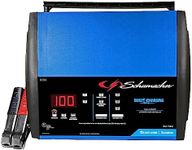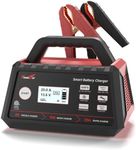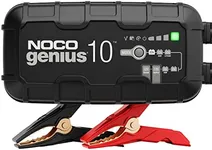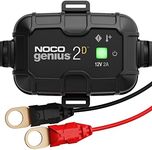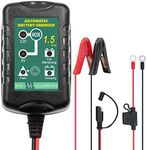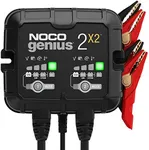Buying Guide for the Best Car Battery Chargers
Choosing the right car battery charger is important to keep your vehicle's battery healthy and ready to go. The right charger can help you avoid being stranded with a dead battery and can even extend the life of your battery. When shopping for a car battery charger, it's important to understand the key features and specifications so you can match the charger to your vehicle's needs and your own usage habits.Charging Amperage (Current Output)Charging amperage refers to how quickly the charger can deliver power to your battery. Higher amperage means faster charging, while lower amperage is slower but gentler on the battery. Chargers typically range from 1 amp (trickle chargers) to 10 amps or more (fast chargers). If you want to maintain a battery over long periods (like for a car in storage), a low-amp trickle charger is best. For regular charging or reviving a dead battery, a mid-range charger (4-10 amps) is suitable. If you need to charge quickly or for larger batteries (like trucks), a higher-amp charger may be necessary. Consider how fast you need to charge and how often you'll use the charger to pick the right amperage.
Voltage CompatibilityMost car batteries are 12 volts, but some vehicles (like motorcycles or older cars) may use 6-volt batteries. It's important to choose a charger that matches your battery's voltage. Some chargers are multi-voltage and can switch between 6V and 12V, which is useful if you have different types of vehicles. Always check your battery's voltage before buying a charger to ensure compatibility.
Automatic vs. Manual OperationAutomatic chargers can sense when the battery is fully charged and will stop or switch to a maintenance mode, preventing overcharging and damage. Manual chargers require you to monitor the charging process and turn them off when the battery is charged. Automatic chargers are more user-friendly and safer, especially if you want to 'set it and forget it.' Manual chargers may be cheaper but require more attention. If you prefer convenience and safety, go for an automatic charger.
Safety FeaturesSafety features like reverse polarity protection, spark-proof clamps, and short-circuit protection help prevent accidents and damage to your battery or vehicle. These features are especially important if you're not experienced with car maintenance. Look for chargers that clearly list these protections, as they make the charging process much safer and more foolproof.
Battery Type CompatibilityCar batteries come in different types, such as lead-acid, AGM, gel, and lithium. Not all chargers are compatible with every battery type. Make sure the charger you choose is suitable for your battery's chemistry. Some chargers are versatile and can handle multiple types, which is helpful if you have more than one kind of battery to maintain.
Portability and SizeThe size and weight of a charger can affect how easy it is to use and store. Compact, lightweight chargers are easier to carry and store in your vehicle, while larger units may offer more features or higher power. If you plan to keep the charger in your car for emergencies, portability is important. For home use, size may be less of a concern.
Additional FeaturesSome chargers offer extra features like battery testing, desulfation (to help restore old batteries), or jump-start capabilities. These can add convenience and value, especially if you want a multi-purpose tool. Think about whether you need these extras or if a basic charger will meet your needs.
